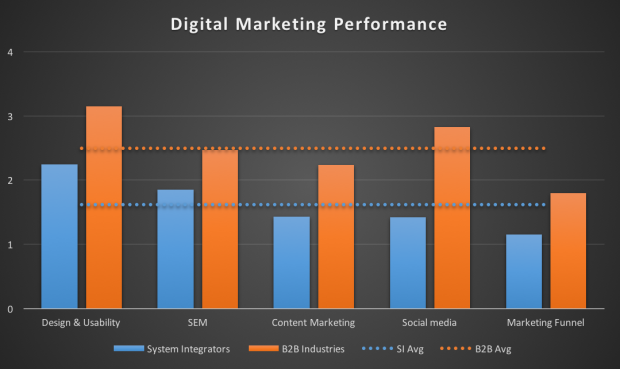
Click here to download your free copy of the complete 2015 Control System Integrator Digital Marketing Benchmark Report.
With my background in industrial controls and leadership positions in the International Society of Automation (ISA), control system integrators are near and dear to my heart. I have lots of friends and colleagues who work in that industry. Over the past few years, I’ve conducted dozens of digital marketing assessments for control system integrators and other automation companies. I thought it would be interesting to conduct an industry-wide assessment and see how the industry as a whole is adapting to digital marketing trends.
We randomly selected 100 North American control system integrators and assessed their digital marketing effectiveness against 32 separate criteria. These criteria are divided into 5 categories:
- Design & Usability: How well does the website welcome visitors and communicate the company’s unique value proposition?
- Search Engine Marketing (SEM): Is the website optimized in order to receive organic search traffic and is paid search being leveraged?
- Content Marketing: Is there content available on the website to attract visitors and generate links because it offers value to prospective leads?
- Social Media: Does the website connect with multiple, active and engaged social media channels?
- Marketing Funnel: Are there offers for visitors to enter the marketing funnel at every stage, not simply the bottom, sales stage?
The results would seem to indicate that control system integrators lag behind other B2B industries by a significant margin. We compared them against our archive of previous surveys and evaluations and found that integrators fell short in each of the five categories:
That’s the bad news. However, the good news is that it means the playing field is fairly wide open and opportunities abound for integrators to step in and quickly fill the void.
Key Findings
We summarized the key findings from our survey and put together a presentation that highlights not only the deficiencies but the opportunities as well.
Websites are outdated in terms of messaging and technology:
- 79% of CSI websites we analyzed make site visits from a mobile device difficult or impossible, alienating nearly half of their web visitors.
- 48% of the website cannot easily change site content or even enable blogging, as they do not use a Content Management System (CMS).
- 45% of all sites studied make no attempt to establish trust with site visitors through the use of social proof, such as testimonials, awards, certifications, memberships, etc.
Search engine marketing is nearly non-existent in the industry:
- 3% of websites surveyed were determined to be paying for advertisements on search engines.
- 85% of CSI websites had a Domain Authority below 40, which is a measure of how much clout a website carries with search engines.
- 42% of websites did not have any analytics operating which track their performance.
The industry has not yet adopted content marketing as a strategy:
- 67% of those studied do not list or promote social media accounts, such as Facebook or LinkedIn
- 65% of websites have no blog or news feed.
- 12% had a blog and published industry-focused content (as opposed to company news).
- 88% of websites surveyed did not incorporate social sharing buttons, making their content difficult to find and share.
There are very few mechanisms in place to interact with prospects:
- 2% of websites were connected to a marketing automation tool.
- 84% of websites surveyed did not utilize visible call-to-action buttons.
- 95% of websites failed to use landing pages, which contain an offer designed to collect information from prospects.
Click here to download the 2015 Control System Integrators Digital Marketing Benchmark Report.
